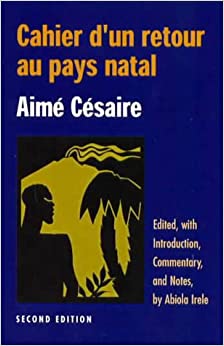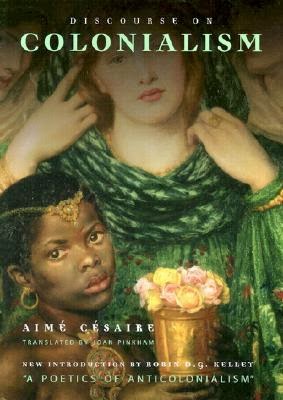A thread on the life and work of Aimé Césaire:
Aimé Césaire was an #anticolonialist poet and politician, who helped found the journal #Black Student in Paris in the 1930s, which gave birth to the idea of “negritude,” a call to blacks to cultivate pride in their heritage.
Aimé Césaire was an #anticolonialist poet and politician, who helped found the journal #Black Student in Paris in the 1930s, which gave birth to the idea of “negritude,” a call to blacks to cultivate pride in their heritage.
When asked to define the meaning of negritude, Cesaire said it was "the affirmation that one is black and proud of it". He described himself as a "negro, negro from the bottom of the sky immemorial".
Césaire became a teacher at the Lycée Schoelcher in Fort-de-France, where he taught Frantz Fanon, becoming a great influence on Fanon, both as a mentor and contemporary.
His works include the book-length poem Cahier d'un retour au pays natal (1939), (Notebook of a Return to the Native Land), a vivid and powerful depiction of the ambiguities of Caribbean life and culture in the New World.
First published in 1939, Cahier d'un retour au pays natal, is considered the undisputed masterpiece of négritude and a poetic milestone of militant anti-colonialism and metaphorical inventiveness.
His other book, “Discourse on Colonialism” is considered a classic of French political literature. it is a denunciation of European colonial racism, decadence, and hypocrisy. that was republished in the French review Présence Africaine in 1955 (English translation 1957).
In 2006 he refused to meet with Mr. Sarkozy, who was then minister of the interior, because of Mr. Sarkozy’s endorsement of a bill citing the “positive role” of colonialism. This law was considered by many as a eulogy to colonialism and French actions during the Algerian War.
The law required teachers and textbooks to "acknowledge and recognize in particular the positive role of the French presence abroad, especially in North Africa". President Jacques Chirac finally had to get this controversial law repealed.
Césaire's works conceptualized African unity and black culture in ways that allowed for the creation of black spaces, from the establishment of several literary journals to his reworking of Caliban's speech from Shakespeare's The Tempest.
https://letudiantnoir.webs.com/
https://letudiantnoir.webs.com/
His text criticizes the hypocrisy of justifying colonization with the equation "Christianity=civilized, paganism=savagery", comparing white colonizers to "savages".
Césaire writes that "no one colonizes innocently, that no one colonizes with impunity either" concluding that "a nation which colonizes, that a civilization which justifies colonization - and therefore force - is already a sick civilization".
Césaire argues that Nazism was not an exception or singular event in European history; rather, the natural progression of a civilization that justified colonization without "perceiving the dangers involved in proceeding towards savagery."
While Césaire the poet inveighed against the cultural arrogance of Europe and celebrated a mythic African identity, Césaire the politician tied the mostly African-descended people of Martinique to the assimilationist structure of the French republic.
The complex formulation of the identity of colonized people is perhaps expressed most succinctly in his reworking of Caliban’s speech from Shakespeare’s The Tempest:
that you have ended by imposing on me
an image of myself.
underdeveloped, you brand me, inferior...
that you have ended by imposing on me
an image of myself.
underdeveloped, you brand me, inferior...
That is the way you have forced me to see myself
I detest that image! What’s more, it’s a lie!
But now I know you, you old cancer,
and I know myself as well’.
Here, you can watch a documentary about Aimé Césaire:
(End)
I detest that image! What’s more, it’s a lie!
But now I know you, you old cancer,
and I know myself as well’.
Here, you can watch a documentary about Aimé Césaire:
(End)

 Read on Twitter
Read on Twitter





